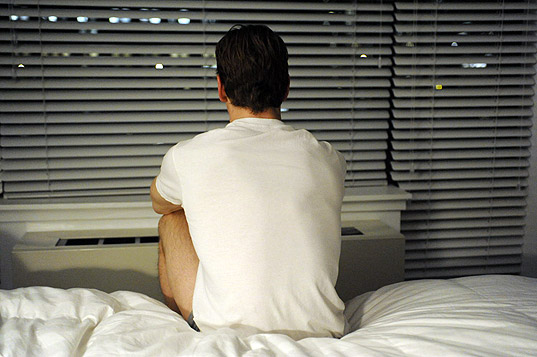Brandon.
It's a coincidence for this film to have included a reference to "Gimme Shelter" (describing it as 'hell') because, along with the said Rolling Stones documentary, "Shame" is really one of the few films that has truly left me shaken, despite of its polished filmmaking facade, because what it shows is all too real. And despite of its extreme sexual content, this is also one of the few instances that it was absolutely necessary.
But aside from that, "Shame" is also my solid proof, based on their powerful performances, that Michael Fassbender and Carey Mulligan are genuine acting forces to be reckoned with. "Shame", for a lack of a better description, is what "American Psycho" would be minus the killer instinct and the violence but with uncontrollable lust and utter regret as their substitutes. And unlike the said Mary Harron adaptation of the Bret Easton Ellis novel, "Shame" speaks volumes of truth that "American Psycho" can't even muster to raise save for its satiric tone towards '80s yuppie narcissism. Oh, and did I forget that "Shame" has heart?
Composed of scenes that have seemingly rendered New York city as a 'sleepy' metropolis merely populated by few nightly nocturnes roaming the city's underground bar and sex club scenes, "Shame" is an intense character study of one man leading an all too isolated sexual life in an all too big a city with little to no care in the world.
Living in a posh, minimalist apartment filled with boxes and boxes of pornographic materials and a steady income more than adequate for some nightly prostitutes, Brandon (Michael Fassbender), originally born in Ireland and has grown in New Jersey, is now living his own version of the American Dream. And where's better to consume it in excessively emotionless amounts than in the so-called center of the world that is New York City?
But then we can't accuse Brandon of not going after any emotional connections either. Trying his romantic luck with a co-worker named Marianne (Nicole Beharie), he forces himself towards love; an idea, along with marriage, that he was otherwise skeptic about.
But like Travis Bickle's complete opposite, a character that's desperately in search for some genuine romantic attachment, Brandon's intended connection with Marianne might have been done just so he can tell to himself that at least he has tried this pesky little 'love' thing. And assuring himself with that fact, that he can't really exist within the context of genuine romantic affection (marked by his inability to have proper sex with her), he once again wills himself back to his empty pleasures.
For Brandon, his is a life worthy of envy, but not until his quite unstable sister Sissy (Carey Mulligan) unexpectedly comes to visit. With too simple a story, also written by its director Steve McQueen, we are given an unforgettable tale of obsession and sexual descent. But given that those themes have been tackled in many films before, "Shame" separates itself by highlighting another: the painful, guilt-ridden emotions the morning after.
There's this powerful scene in the film that shows Brandon, after spending a night of sexual experimentation, in a complete emotional breakdown. Twisting his body in a semi-fetal position and gnashing his teeth, with fists closed, he implodes in a controlled and inhibited rage not towards the prostitutes and the sexual materials that have been the instruments of his sexual excesses, but towards himself.
Michael Fassbender, in probably the most overlooked but also maybe the best performance of 2011, has painted and embodied a painfully complex character in the form of Brandon. By conveying a very convincing and an almost frightening character transformation, from a silent and laid back young professional into a sex-chasing desperation-incarnate to a poor sap trapped within his own compulsions, not to mention Brandon's intimate yet hostile relationship with his sister, Fassbender has brilliantly portrayed a modern man's conflict between extreme hedonism and familial affection.
What would he choose more? a path of sexual self-destruction or his dysfunctional relationship with his sister? The fine line has already been blurred, and maybe, just maybe, Brandon can handle them both, but not without any absolute consequences, and with a hand 'shamefully' covering a side of his face.
"Shame", one of my most anticipated films of 2011, has equated my hype towards it and has introduced unto me a major collaborative force in the form of Michael Fassbender and Steve McQueen. Fassbender, who has portrayed a revolutionary psychiatrist in "A Dangerous Method", has now played here in "Shame" a man who might be in dire need of one.
FINAL RATING





